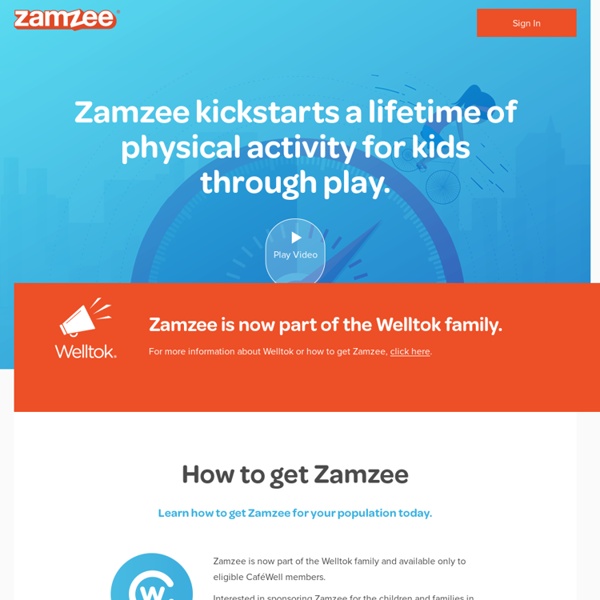



NMSU: Learning Games Lab - Learning Games Lab Wockets: Open Source Accelerometers for Phones Sensors and Software for Real-Time Activity Recognition on Mobile Phones The goal of this open source project is to create software and hardware that permits automatic, 24/7 physical activity and context detection on common mobile phones. We are doing this by iteratively designing and testing Wockets -- miniature, low-cost hardware devices that will measure human motion using accelerometers. The software that uses Wockets will be free and open source. This project is a collaboration between the Northeastern University Personal Health Informatics program, MIT House_n, and the Stanford Prevention Research Center. To receive occasional updates on the project, please join the project mailing list. SimCityEDU | A game-based learning and assessment tool for middle school students covering the Common Core and Next Generation Science Standards.
Thingiverse - Digital Designs for Physical Objects Twenty Tips for Managing Project-Based Learning In honor of Edutopia's 20th anniversary, we're producing a series of Top 20 lists, from the practical to the sublime. 20 Tips for Managing Project-Based Learning 1. Use Social Media One of the best ways to document collaboration and engage students with technology is use social media platforms like Edmodo. Students can use it to share ideas, you as the teacher can use it to formatively assess where students are in terms of products and content knowledge, and it is a great way to have real evidence of collaboration. 2. 3. 4. 5. 6. 7. 8. 9. 10. 11. 12. 13. 14. 15. 16. 17. 18. 19. 20. Bonus! A quick note on these tips: There is no real silver bullet to get every single kid under the sun engaged in your classroom, but good teachers use all the strategies they can muster.
Agile Learning Center | Manhattan Free School The structure of an Agile Learning Center is designed to nourish a productive, vibrant, and healthy culture – allowing participants to engage authentically in a learning process that cultivates confidence, dynamic skill sets, mental agility, self-awareness, and group skills. Morning Intentions The day kicks off with a Morning Intentions meeting, which operates much like a scrum stand-up meeting would in an Agile Management environment. Each person takes a turn announcing their intentions -- making declarations for how they will spend the day, and making requests for any support they may need. This simple process only takes about ten to fifteen minutes, but serves an extremely important purpose of starting each day with intention and accountability. By continually engaging in this practice, learners are cultivating highly useful skills in time-management, teamwork, self-awareness and self-assessment. Afternoon Accomplishments Kanban Boards Weekly Sprints Coaches Gameshifting and Polymorphism
Genius Hour Ideas On Friday my classes made their genius hour topic selections. At the beginning of the class I told them that I was changing the name of our time together from “Passion Projects” to “Genius Hour”. They seemed to appreciate the thought of me thinking they were all geniuses. I pulled up our brainstorming pages from last week and went through them again. My classroom doesn’t have computers in it, so we all packed up and went down the hall to the computer lab. As the entries came flying in, I called them up one by one to either approve or deny the project. In the spirit of transparency I’m going to list all of the project selections that I received. We have not spent any time discussing the creation part of the genius hour projects. Genius Hour Ideas – 6th graders Once the students selected their topics they began their research. I also found a cool Chrome plugin called Save to Drive that allows students to save websites and media to directly to their Google Drives with one click.
MaKey MaKey | A Creative, Unique Gift Idea for Everyone | Electronic Invention Kit - Buy Direct (Official Site) Imagination Foundation